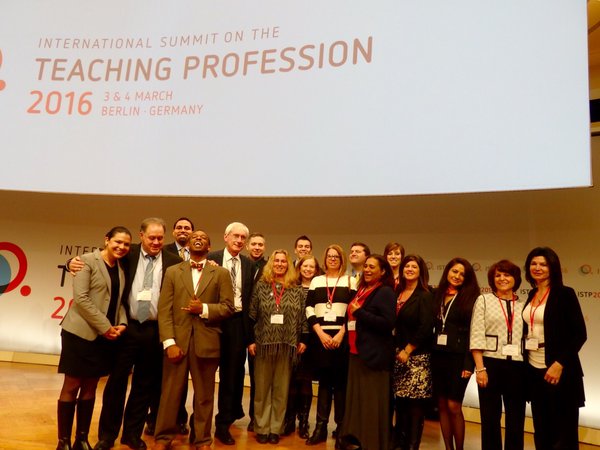At 3:30 am, a few weeks ago, I took a taxi on a whim and asked the driver to take my picture at a popular graffiti art on the partially standing Berlin Wall. The artwork, by Dmitri Vrubel, portrays, “the Death Kiss” of Leonid Brezhnev and Erich Honecker in brotherly love, which celebrated the 30th anniversary of the German Democratic Republic. Vrubal created his art after the collapse of The Wall and serves to remind visitors of East Berlin’s dark communist past, but one that succumbed to the increasing urgency for change—progressive thought, global dialogue and a unified vision of a better world.
To this historic city of Berlin, Germany, education stakeholders, ministers of education, union leaders and teacher leaders representing 23 high-performing nations added a layer of history at the International Summit on the Teaching Profession (ISTP 2016).

I served as a member of the United States delegation, led by the Acting Secretary of Education John King on March 4th and 5th. Other members of the delegation were Rob Weil of the American Federation of Teachers (AFT), Chris Minnich of Council of Chief of State School Officers (CCSSO), Lily Eskelsen-Garcia of National Education Association (NEA) and a team of teacher leaders and Senior Advisors to the Secretary, Ruthanne Buck and Maureen Mclaughlin.
As a National Board Certified Teacher and an active teaching professional sponsored by the National Board for Professional Teaching Standards, I (along with other teacher leaders, Kiragu Beauttah, Jeff Charbonneau, Sean McComb, Gwendolin Bandi and Bootsie Battle-Holt) was honored to have a voice at the table and contribute to the global discussion on how teachers are a crucial part of shaping education policies – policies to create the right conditions for teacher efficacy that produce excellent learning outcomes. The broader themes that emerged at the summit included:
- Teacher-driven education policies
- Teacher retention
- Elevating the profession
- Equity and diversity
- Teacher-led professional development
- Student-centered learning.
Representatives from Singapore, consistently referred to as having a successful public school system based on its student-learning outcomes, pointed out that the success of the teaching profession hinges on trust. They stressed that unions, policymakers and active teaching professionals have to unite to reform the education system so that teaching and student learning become the top most priority. The U.S. delegation was equally strong in our support for lifting teacher voice, reducing testing, and collaborating with teachers to reset the profession.
A common theme that emerged from the gathering was how to meet the needs of the migrant population. Germany was on course to take in one million refugees by 2015 and facing social and educational integration challenges. Such a concern resonates with concerns in the U.S., as we face challenges in meeting the needs of our own diverse population. In fact, when each country’s delegation separated to brainstorm on national commitments to take back to their country, the U.S. group committed to implementing the new education law, Every Student Succeeds Act (ESSA), by:
- Creating standards of support for teaching professionals
- Encouraging states to elevate teacher leadership and voice
- Creating opportunities to promote student equity and teacher diversity
- Changing the narrative around teaching to improve teacher retention and recruitment
The other two National Board Certified Teachers as part of the United States team, Bootsie Battle-Holt, Jeff Charbonneau and myself, true to our National Board training, consistently stressed that classroom instruction should be driven by reflective teaching and student knowledge.
On the last day of the summit, each country gave a 90 second recap of their global and national commitment and professed to uplift the profession in their home country.
As I rode from the East side of Berlin to the Tegel Airport, I was hopeful for teachers, students and the teaching profession as a whole because true education reform occurs only when teacher leaders are given a seat at the policy table. We must help policymakers develop a system for autonomy where teachers take ownership for student learning and perform with excellence.
